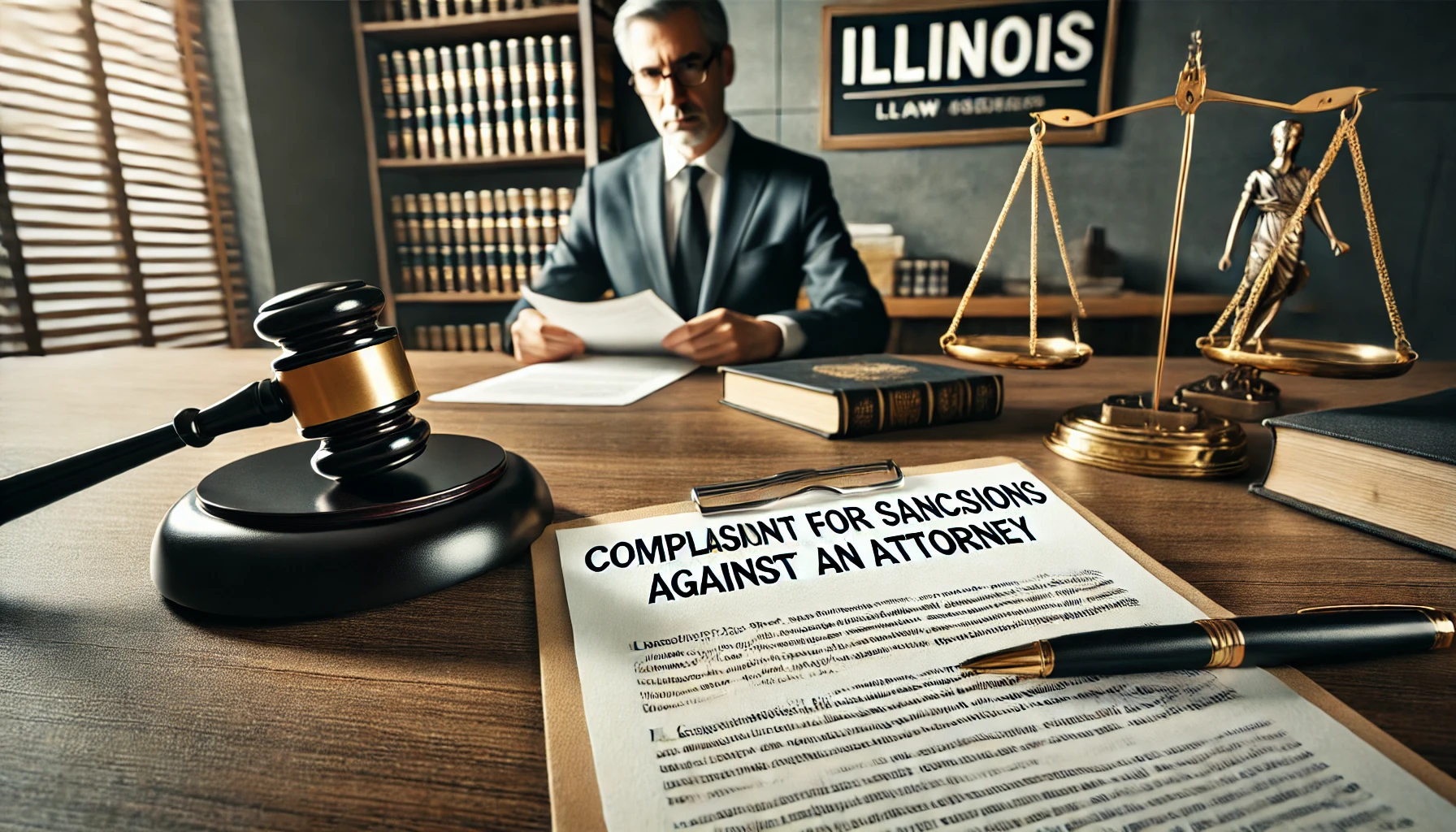Law & Personal Injury
How to File a Sample Complaint for Sanctions Against an Attorney in Illinois

Introduction
Understanding Attorney Sanctions in Illinois
Attorneys must follow strict rules in Illinois. If a lawyer does something wrong, they may face penalties. These penalties are called sanctions. A person who believes a lawyer acted unfairly can file a complaint for sanctions against an attorney in Illinois.
Sanctions help keep lawyers honest. They stop attorneys from misusing their power. If a lawyer breaks the rules, they may lose their license, pay fines, or face other legal actions. People who file a complaint for sanctions want justice and fair treatment.
Common reasons for filing a complaint include:
- Lying in court
- Hiding important information
- Charging unfair fees
- Ignoring client needs
- Breaking ethical rules
If someone believes an attorney has done something wrong, they can report the issue. Illinois has official agencies that review complaints. They check if the lawyer followed legal and ethical rules. If the complaint is valid, they may take action against the attorney.
This article explains how to file a sample complaint for sanctions against an attorney in Illinois. It also provides an example of a complaint and discusses possible outcomes. People looking for legal help will find useful guidance on how to protect their rights.
Grounds for Filing a Complaint Against an Attorney
Filing a complaint for sanctions against an attorney in Illinois requires valid reasons. Not every mistake or disagreement with a lawyer qualifies for sanctions. Complaints must be based on unethical conduct or legal violations.
Identifying Unethical Conduct
Attorneys must follow rules set by the Illinois Rules of Professional Conduct. If a lawyer breaks these rules, they may face sanctions. Unethical behavior can include:
- Lying or misleading the court – An attorney must always provide truthful information.
- Hiding evidence – A lawyer cannot destroy or withhold documents that are important to a case.
- Overcharging clients – Attorneys must charge fair fees. Hidden fees or excessive billing can be a violation.
- Conflict of interest – A lawyer should not represent two clients if it creates a conflict.
- Ignoring a client’s case – If a lawyer stops working on a case without reason, the client may suffer.
- Revealing confidential information – A lawyer must protect client information and not share it without permission.
If an attorney does any of these things, a person can file a complaint for sanctions to hold them accountable.
Legal Grounds for Sanctions
Illinois law allows sanctions for serious attorney misconduct. Sanctions may apply if a lawyer:
- Violates Illinois Supreme Court Rule 137 – This rule punishes attorneys for filing false legal documents or misleading the court.
- Engages in professional misconduct – The Illinois Attorney Registration and Disciplinary Commission (ARDC) investigates lawyers who violate ethical rules.
- Commits fraud or dishonesty – Lying, forgery, or other fraudulent actions can lead to serious penalties.
- Fails to follow court orders – If a lawyer ignores a judge’s instructions, they may face sanctions.
The person filing a sample complaint for sanctions against an attorney in Illinois must provide evidence. This may include emails, contracts, court filings, or witness statements. The complaint must clearly explain what the attorney did wrong and why sanctions should apply.
Understanding these grounds for sanctions helps people protect their rights and hold attorneys accountable for unethical actions.
Overview of Illinois Supreme Court Rule 137
Illinois Supreme Court Rule 137 is an important law that regulates how attorneys file legal documents in court. It ensures that lawyers do not submit false or misleading information. If an attorney violates Rule 137, a person can file a complaint for sanctions against an attorney in Illinois to seek penalties.
Purpose and Scope of Rule 137
The main goal of Rule 137 is to prevent lawyers from abusing the legal system. It applies to attorneys who file frivolous, dishonest, or misleading court documents. The rule ensures that all legal papers submitted in court are:
- Truthful and based on facts
- Supported by legal evidence
- Not intended to delay or harass the other party
If an attorney files false claims, hides facts, or misuses legal filings, they can be sanctioned under Rule 137. Sanctions may include:
- Fines – The attorney may have to pay money as punishment.
- Attorney fees – The lawyer may be required to pay the legal costs of the other party.
- Court penalties – The judge may issue other disciplinary actions.
Judges have the power to enforce Rule 137. If a person believes an attorney has violated this rule, they can submit a sample complaint for sanctions against an attorney in Illinois to request an investigation.
Historical Context and Amendments
Illinois Rule 137 was created to ensure fairness in the legal system. It is based on Rule 11 of the Federal Rules of Civil Procedure, which also prevents lawyers from making false legal claims. Over time, Illinois has updated Rule 137 to improve its effectiveness.
Key amendments to the rule include:
- Stronger enforcement – Courts now take attorney misconduct more seriously.
- Clearer definitions – The rule now better explains what counts as a violation.
- More detailed sanctions – Judges have more options when punishing misconduct.
These changes help protect people from dishonest legal practices. If an attorney violates Rule 137, a person can file a complaint for sanctions to seek justice.
Understanding Rule 137 is important for anyone dealing with unethical legal actions. It gives individuals the power to challenge dishonest attorneys and demand fair treatment in court.
Steps to File a Complaint for Sanctions
Filing a complaint for sanctions against an attorney in Illinois requires following specific steps. A well-prepared complaint increases the chances of the case being reviewed seriously. Below are the key steps to take when filing a complaint.
Gathering Necessary Documentation
Before filing a complaint, a person must collect strong evidence to support their claims. The complaint must show how the attorney violated legal or ethical rules. The following documents can help build a strong case:
- Court filings – Copies of any false, misleading, or unethical legal documents filed by the attorney.
- Emails and messages – Proof of communication showing misconduct, misrepresentation, or unethical behavior.
- Billing records – Documents showing unfair charges or hidden fees.
- Witness statements – Testimonies from individuals who observed the attorney’s misconduct.
- Court transcripts – Records of statements made in court that contain false or misleading information.
Having solid proof helps ensure the complaint for sanctions against an attorney in Illinois is taken seriously.
Filling Out the Complaint Form
Once all necessary documents are gathered, the next step is to write and submit the complaint. The complaint should include:
- Personal information – Name, address, and contact details of the person filing the complaint.
- Attorney’s details – Name, law firm, and any relevant case numbers.
- Description of misconduct – A clear and detailed explanation of what the attorney did wrong.
- Supporting evidence – Copies of emails, documents, or records that prove the misconduct.
- Requested action – A statement on what the complainant wants, such as fines or legal penalties.
Complaints should be concise, factual, and well-organized. A sample complaint for sanctions against an attorney in Illinois can help structure the document properly.
By following these steps, individuals can hold attorneys accountable for misconduct and ensure that legal ethics are upheld in Illinois.
Sample Complaint for Sanctions Against an Attorney in Illinois
A complaint for sanctions against an attorney in Illinois must be clear, well-structured, and supported by evidence. Below is a detailed example of a complaint, along with key elements that must be included.
Detailed Example of a Complaint
[Your Name]
[Your Address]
[City, State, ZIP Code]
[Phone Number]
[Email Address]
[Date]
To:
Illinois Attorney Registration and Disciplinary Commission (ARDC)
130 E. Randolph Dr., Suite 1500
Chicago, IL 60601
Subject: Complaint for Sanctions Against [Attorney’s Name]
Dear ARDC Disciplinary Board,
I am filing this formal complaint for sanctions against [Attorney’s Name], who is licensed to practice law in Illinois. I believe the attorney has engaged in misconduct, violating professional and ethical standards. I request a review of this complaint and appropriate disciplinary action.
Attorney Information
- Name: [Attorney’s Full Name]
- Law Firm: [Law Firm Name]
- Bar Number: [Attorney’s Illinois Bar Number]
- Address: [Attorney’s Office Address]
Nature of the Complaint
I retained [Attorney’s Name] to represent me in [Case Name or Number] in the [Name of Court]. The attorney engaged in the following unethical conduct:
- Filing false or misleading court documents – [Provide details of any false statements, omissions, or misleading filings].
- Violating Illinois Supreme Court Rule 137 – The attorney submitted documents that were not based on fact or law, leading to unnecessary legal expenses and delays.
- Failure to act in the best interest of the client – [Describe how the attorney neglected responsibilities, overcharged, or failed to communicate].
- Unethical billing practices – The attorney charged excessive fees and included services not performed.
Supporting Evidence
I am including the following documents as evidence of the attorney’s misconduct:
- Court filings submitted by [Attorney’s Name] that contain false or misleading information.
- Emails and communications that demonstrate unethical behavior.
- Billing statements showing improper charges.
- Witness statements from individuals familiar with the case.
Requested Action
I request that the Illinois Attorney Registration and Disciplinary Commission (ARDC) investigate this matter and impose appropriate sanctions against [Attorney’s Name]. Possible disciplinary actions may include fines, attorney suspension, or disbarment.
I appreciate your time in reviewing this complaint. I am available to provide further information if needed.
Key Elements to Include in a Complaint
A sample complaint for sanctions against an attorney in Illinois should always include:
- Personal and attorney details – Contact information for both the complainant and the attorney.
- Specific allegations – A clear explanation of how the attorney violated legal or ethical standards.
- Evidence – Documents, emails, and other proof supporting the claims.
- Legal references – Mention violations of Illinois Supreme Court Rule 137 or other relevant laws.
- Requested action – State what penalties or sanctions should be imposed.
Filing a well-prepared complaint increases the likelihood of an investigation and disciplinary action against unethical attorneys.
Potential Outcomes of Filing a Complaint
Filing a complaint for sanctions against an attorney in Illinois can lead to different outcomes, depending on the severity of the misconduct and the evidence provided. The Illinois Attorney Registration and Disciplinary Commission (ARDC) or the court handling the case will review the complaint and decide whether sanctions should be imposed.
Possible Sanctions Imposed on Attorneys
If the ARDC or a court finds that an attorney violated ethical or legal standards, they may impose various sanctions, including:
- Reprimand – A formal warning issued to the attorney, usually for minor violations.
- Fines or Financial Penalties – The lawyer may have to pay fines or cover legal costs for the complainant.
- Mandatory Ethics Training – In some cases, the attorney may be required to complete additional legal ethics courses.
- Suspension – The attorney’s law license may be suspended for a certain period, preventing them from practicing law.
- Disbarment – In severe cases, the attorney may lose their license permanently, preventing them from practicing law in Illinois.
- Court-Imposed Sanctions – If a lawyer files false or misleading documents, the court may issue penalties under Illinois Supreme Court Rule 137, such as dismissing the attorney’s filings or awarding legal costs to the opposing party.
The severity of the sanction depends on the nature of the violation, the lawyer’s disciplinary history, and the impact of their misconduct on the case.
Impact on the Complainant
Filing a complaint for sanctions against an attorney in Illinois can have different effects on the person who submitted the complaint:
- Justice and Accountability – If the complaint is successful, the attorney may be held accountable for their actions, preventing further misconduct.
- Possible Case Dismissal or Reversal – If an attorney’s misconduct affected a court case, a successful complaint might result in a case being reopened or overturned.
- Financial Compensation – In some cases, if a lawyer overcharged or mishandled funds, the complainant may receive reimbursement.
- Retaliation Risks – While uncommon, an attorney might attempt to challenge the complainant’s claims. However, the ARDC protects individuals who file complaints in good faith.
- Time and Effort – The complaint process may take several months, requiring patience and follow-ups with the ARDC or court.
Submitting a well-documented complaint with strong evidence increases the chances of a favorable outcome. This process helps maintain integrity in the legal system and ensures that attorneys uphold ethical standards.
Case Studies: Notable Sanction Cases in Illinois
Examining past cases where attorneys faced sanctions in Illinois provides valuable insights into the application of disciplinary measures and the importance of ethical conduct in the legal profession.
Analysis of Significant Cases
In re Himmel (1988):
Attorney James Himmel was suspended for one year for failing to report another lawyer’s misconduct. His client had informed him that her previous attorney misappropriated settlement funds, but Himmel honored the client’s request not to report the misconduct. The Illinois Supreme Court held that attorneys have an obligation to report unethical behavior, emphasizing the duty to uphold the integrity of the profession.
McCarthy v. Taylor (2019):
In this case, the plaintiff, an attorney representing himself, filed a lawsuit alleging tortious interference by another attorney. The court dismissed the complaint and imposed sanctions under Illinois Supreme Court Rule 137, concluding that the claims were unfounded and lacked legal basis. This case underscores the necessity for attorneys to ensure that their filings are well-grounded in fact and law.
Sanction Affirmed for Lawyer Accused of Misconduct During Deposition (2024):
A federal appeals court upheld a nearly $12,000 sanction against a Chicago lawyer accused of misleading the court about intentionally pushing opposing counsel during a tense deposition. The court found that the attorney’s actions and subsequent misrepresentations warranted financial penalties, highlighting the importance of honesty and professionalism in legal proceedings.
Lessons Learned from Past Complaints
These cases offer several key takeaways:
- Mandatory Reporting: Attorneys are required to report known misconduct by their peers. Failure to do so can result in significant disciplinary action, as seen in In re Himmel.
- Filing Integrity: Legal filings must be based on factual evidence and sound legal principles. Submitting frivolous or baseless claims can lead to sanctions, as demonstrated in McCarthy v. Taylor.
- Professional Conduct: Maintaining professionalism and honesty in all legal interactions is crucial. Misconduct, especially when coupled with dishonesty, can result in severe penalties, as evidenced by the 2024 deposition incident.
By studying these cases, legal professionals and the public can better understand the standards expected in the legal field and the consequences of deviating from ethical practices.
Legal and Ethical Considerations
Filing a complaint for sanctions against an attorney in Illinois involves both legal and ethical factors. The legal system must balance client rights with an attorney’s ability to defend themselves. Additionally, the person filing the complaint must meet the burden of proof to support their claims.
Balancing Client Rights and Attorney Defenses
Clients have the right to honest, fair, and competent legal representation. If an attorney violates ethical rules, clients can file a complaint for sanctions. However, attorneys also have the right to defend themselves against false or exaggerated claims.
The Illinois Attorney Registration and Disciplinary Commission (ARDC) and the courts ensure that both sides are treated fairly. When reviewing a complaint, they consider:
- The client’s allegations – Has the attorney violated Illinois Supreme Court Rule 137 or other professional conduct rules?
- The attorney’s defense – Does the lawyer have evidence that proves their actions were lawful and ethical?
- The impact of the alleged misconduct – Did the attorney’s actions cause harm to the client or the legal process?
If an attorney acted in good faith but made a minor mistake, they may not face serious penalties. However, if there is clear evidence of misconduct, sanctions may be imposed.
Understanding the Burden of Proof
The burden of proof refers to the responsibility of proving that the attorney committed misconduct. In Illinois, the person filing a complaint for sanctions against an attorney must provide strong evidence.
Evidence can include:
- Emails, contracts, and court documents showing false statements or unethical behavior.
- Witness statements from people who saw or experienced the attorney’s misconduct.
- Billing records proving excessive fees or fraudulent charges.
- Court transcripts showing misleading or false claims made by the attorney.
The ARDC or court will review the evidence before deciding on sanctions. Complaints that lack proof or are based on personal disagreements may be dismissed.
Understanding legal and ethical considerations is important when filing a complaint for sanctions against an attorney in Illinois. A strong case backed by solid evidence increases the chances of a fair outcome and ensures accountability in the legal profession.
Resources for Further Assistance
Filing a complaint for sanctions against an attorney in Illinois can be a complex process. If you need help, several organizations provide guidance and legal support. Below are key resources, including the Illinois Attorney Registration and Disciplinary Commission (ARDC) and other legal aid organizations that assist individuals with attorney misconduct complaints.
Contact Information for the Illinois Attorney Registration and Disciplinary Commission (ARDC)
The ARDC is responsible for investigating complaints against attorneys in Illinois. If an attorney violates professional conduct rules, the ARDC can impose sanctions or recommend disciplinary action.
Illinois ARDC Contact Details:
- Website: www.iardc.org
- Phone: (312) 565-2600 (Chicago Office) | (217) 522-6838 (Springfield Office)
- Address (Chicago Office):
130 E. Randolph Dr., Suite 1500,
Chicago, IL 60601 - Address (Springfield Office):
One Prudential Plaza,
400 W. Monroe St., Suite 200,
Springfield, IL 62704 - Email: information@iardc.org
The ARDC website offers online complaint forms, disciplinary records, and legal ethics resources.
Additional Legal Aid Organizations
If you need assistance filing a complaint for sanctions against an attorney in Illinois, the following organizations can help:
- Illinois State Bar Association (ISBA)
- Provides legal resources and referrals to ethics attorneys.
- Website: www.isba.org
- Phone: (800) 252-8908
- Chicago Bar Association (CBA)
- Offers free and low-cost legal advice on attorney ethics and misconduct.
- Website: www.chicagobar.org
- Phone: (312) 554-2000
- Legal Aid Chicago
- Provides free legal assistance to low-income individuals dealing with attorney misconduct or legal malpractice.
- Website: www.legalaidchicago.org
- Phone: (312) 341-1070
- Citizen Advocacy Center
- Helps Illinois residents navigate the legal system and file complaints against unethical attorneys.
- Website: www.citizenadvocacycenter.org
- Phone: (630) 833-4080
- Illinois Legal Aid Online
- Provides step-by-step guides on how to file a complaint for attorney misconduct.
- Website: www.illinoislegalaid.org
These organizations can provide advice, assistance, and resources to help individuals navigate the complaint process. Seeking legal guidance ensures that complaints are properly filed and increases the chances of a successful outcome.
Conclusion
The legal profession must uphold ethical standards to ensure fairness and justice for all. Attorneys have a duty to follow the law, act honestly, and represent their clients responsibly. When lawyers engage in misconduct, filing a complaint for sanctions against an attorney in Illinois helps protect the legal system’s integrity. By holding attorneys accountable, individuals help maintain trust in the courts and prevent unethical practices from harming others.
Filing a complaint is a serious step, but it is necessary when an attorney violates professional or legal rules. Organizations like the Illinois ARDC and legal aid groups ensure that complaints are properly reviewed and that sanctions are imposed when necessary. Reporting misconduct through proper channels promotes accountability and helps create a fair legal system for everyone.
Thank you for visiting our blog! If you enjoyed this post, feel free to check out more interesting and helpful content here.
-

 Entertainment1 week ago
Entertainment1 week agoAura of Vitality 5e: A Complete Guide to Healing and Support in Combat
-

 Fashion1 week ago
Fashion1 week agoWhat are the Differences Between Microlocs vs Sisterlocks?
-

 Entertainment6 days ago
Entertainment6 days agoKamryan Randolph Wrestling: The Journey of a Rising Star in Sports
-

 News1 week ago
News1 week agoCrypto30x.com: A Comprehensive Review and User Guide
















